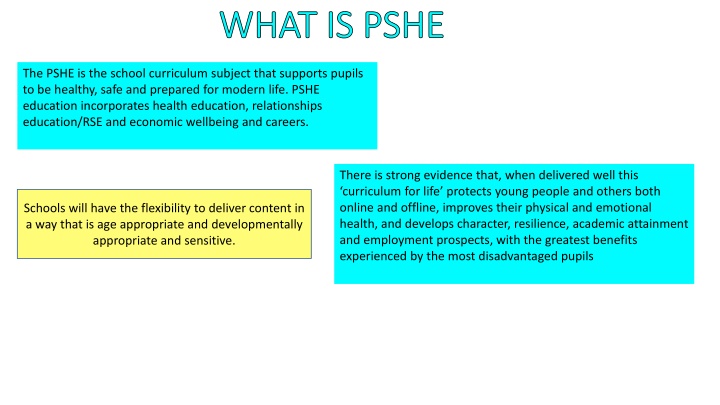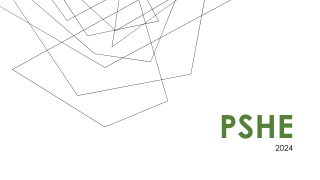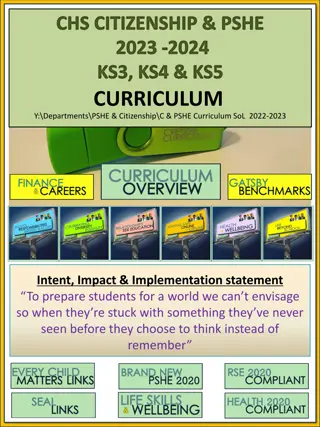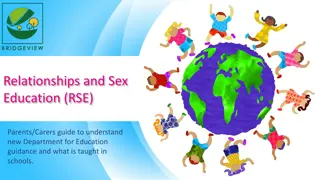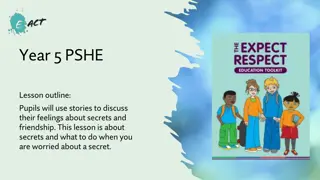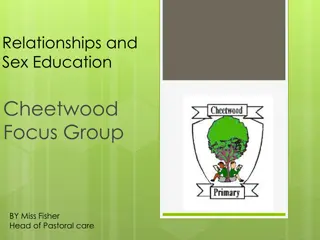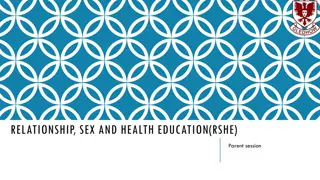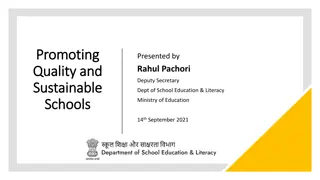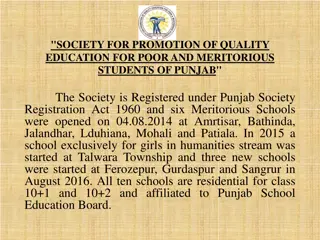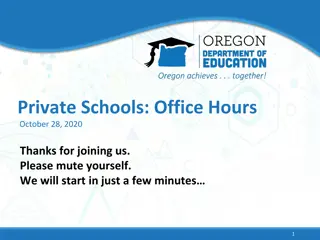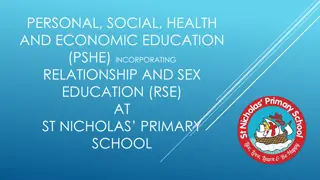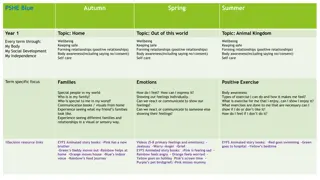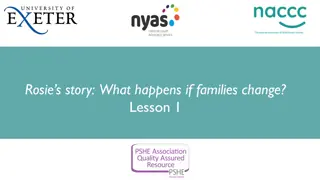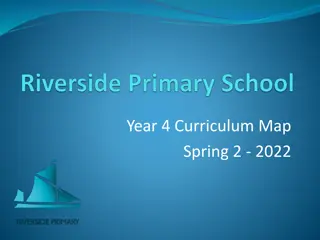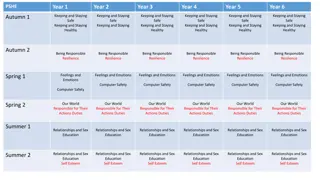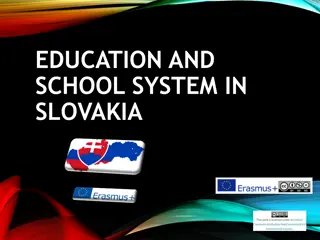Importance of PSHE Education in Schools
PSHE (Personal, Social, Health, and Economic) education is a vital school curriculum subject that equips pupils with the necessary skills and knowledge to lead healthy, safe, and fulfilling lives. It encompasses areas such as health education, relationships education, and economic wellbeing, offering students crucial life lessons that enhance their overall well-being, academic success, and future prospects. The inclusive nature of PSHE fosters a supportive environment for pupils to develop essential life skills, resilience, and a positive outlook on life, contributing to their personal growth and success in various aspects of life.
Uploaded on Feb 16, 2025 | 1 Views
Download Presentation

Please find below an Image/Link to download the presentation.
The content on the website is provided AS IS for your information and personal use only. It may not be sold, licensed, or shared on other websites without obtaining consent from the author.If you encounter any issues during the download, it is possible that the publisher has removed the file from their server.
You are allowed to download the files provided on this website for personal or commercial use, subject to the condition that they are used lawfully. All files are the property of their respective owners.
The content on the website is provided AS IS for your information and personal use only. It may not be sold, licensed, or shared on other websites without obtaining consent from the author.
E N D
Presentation Transcript
WHAT IS PSHE WHAT IS PSHE The PSHE is the school curriculum subject that supports pupils to be healthy, safe and prepared for modern life. PSHE education incorporates health education, relationships education/RSE and economic wellbeing and careers. There is strong evidence that, when delivered well this curriculum for life protects young people and others both online and offline, improves their physical and emotional health, and develops character, resilience, academic attainment and employment prospects, with the greatest benefits experienced by the most disadvantaged pupils Schools will have the flexibility to deliver content in a way that is age appropriate and developmentally appropriate and sensitive.
WHY IS IT SO IMPORTANT? PSHE education gives pupils information on the world of work, challenges stereotypes about different careers and helps pupils to develop the skills they need to succeed in the workplace The non-academic skills and attributes acquired through PSHE education have a positive impact on academic performance and life chances as well as being key to boosting the employability of school- leavers and improving social mobility. PSHE education has been proven to remove barriers to learning and provide skills to aid success A major evidence review37 (covering over 1200 studies) by Pro Bono Economics in 2017 found 'very strong evidence' that PSHE learning has a positive impact on academic attainment, PSHE education as a means to equipping all young people with emergency life-saving skills and knowledge. Educating pupils about their health reduces risk-taking behaviours such as drug or alcohol addiction and improves diet and exercise levels, in turn boosting long-term life chances The evidence shows that PSHE education can improve the physical and psychosocial wellbeing of pupils. A virtuous cycle can be achieved, whereby pupils with better health and well-being achieve better academically PSHE Education: A Review of Impact and Effective Practice, DfE, 2015 There is growing evidence that, when delivered well, PSHE education can promote positive outcomes relating to emotional health while reducing stigma and helping pupils learn where to go if they have mental health concerns. This all helps to boost pupils life chances Safety when students receive information about relationships and sex, disclosures about exploitation and abuse increase significantly - International Cochrane study 2015
The Equality Act 2010 places duties on schools not just to address prejudice-based bullying but also to help to prevent it happening, and in doing so to keep protected characteristic groups safe. PSHE education, with its focus on identity and equality, can help schools to fulfil this duty.
How does the Equality Act impact on Relationships/Health Education? Schools are required to have due regard to the need to: eliminate discrimination, harassment, victimisation and any other conduct that is prohibited by or under the Act; and advance equality of opportunity and foster good relations between persons who share a relevant protected characteristic and persons who do not share it Relevant protected characteristics are age, disability, gender reassignment, pregnancy and maternity, race, religion or belief, sex and sexual orientation 4
Relationships and Sex Education By the end of secondary school, pupils will have been taught content on: families respectful relationships, including friendships online media being safe intimate and sexual relationships, including sexual health Relationships and Sex Education will build on the teaching at primary school. It aims to give young people the information they need to help them develop healthy, nurturing relationships of all kinds. Our school will cover content on what healthy and unhealthy relationships look like and what makes a good friend, colleague and successful marriage or committed relationship. At the appropriate time, the focus will move to developing intimate relationships, to equip your child with knowledge they need to make safe, informed and healthy choices as they progress through adult life. You can find further details by searching relationships, sex and health education on GOV.UK
Health Education By the end of secondary school, pupils will have been taught content on: mental wellbeing internet safety and harms physical health and fitness healthy eating drugs, alcohol and tobacco health and prevention basic first aid changing adolescent body Health Education aims to give children the information they need to make good decisions about their own health and wellbeing, to recognise issues in themselves and others, and to seek support as early as possible when issues arise. You can find further details by searching relationships, sex and health education on GOV.UK.
New PSHE Guidelines CPR/First Aid Basic treatment for common injuries Life-saving skills, including how to administer CPR The purpose of defibrillators and when one might be needed Physical health and fitness associations between physical activity and mental wellbeing, what constitutes a healthy lifestyle maintaining a healthy weight, links between an inactive lifestyle and ill health, including cancer and cardio-vascular ill-health. the science relating to blood, organ and stem cell donation DfE Topics Mental wellbeing Internet safety and harms Drugs alcohol and tobacco Respectful relationships, including friendships Online and media Families Different types of families, Marriage Roles and responsibilities of parents Judge when a family, friend, intimate or other relationship is unsafe Intimate and sexual relationships, including sexual health Citizenship Healthy eating how to maintain healthy eating and the links between a poor diet and health risks, including tooth decay and cancer Physical health and fitness Healthy eating Health and prevention Basic first aid Being Safe The concepts of and laws relating to sexual consent Sexual exploitation, abuse, grooming, coercion, harassment, rape domestic abuse, forced marriage, honour-based violence and FGM How these can affect current and future relationships Health and prevention personal hygiene germs antibiotics Dental Health Immunizations & Vaccines Self-examinations Importance of sleep Changing adolescent body Families Being Safe
DfE Topics requiring classroom lessons DfE Topics requiring classroom lessons Possible link to other subject and project weeks PE Compulsory unit - Physical health and wellbeing Lessons per yr. Topic Science 6 Mental wellbeing Project weeks ( this will allow expert input in key areas and will not cover all content required) 2/3 Internet safety and harms Tutor 3 Physical health and fitness 2 Healthy eating Other areas which are expected and recommended by DofE, PSHE assoc and Ofsted 4 Drugs, alcohol, tobacco Lessons per yr. Topic 4 Health and prevention 8 Health and wellbeing including social emotional intelligence 2 + drop down day Basic first aid Gangs, weapons, peer pressure 2 Changing adolescent body Core values, character development, identity, strengths and goal setting Compulsory unit Relationships and sex education Learning, organisation, research and presentation skills Lessons per yr. Topic Employment, careers, options, choices, enterprise skills 4 Families 6 Respectful relationships including friendships Extremism, intolerance, cults, social med Stereotypes, discrimination, prejudice, British values, human rights 4 Online media 2 Being safe Social media and online presence. 6 + drop down day Intimate and sexual relationships, including sexual health
It will provide the opportunity for a whole school approach in the following areas: It will provide the opportunity for a whole school approach in the following areas: SPIRIT - Empowering Respectful Relationships Relationships and sex education involves learning about the emotional, social and physical aspects of growing up, relationships, sex, human sexuality and sexual health. It also gives young people essential skills for building positive, enjoyable, respectful and non-exploitative relationships and staying safe both on and offline. MIND -The Importance Mental Health Maintaining good mental health is a vital life skill. It is just as important a tool in understanding the body as physical education. This program will be underpinned by mindfulness and this aims to empower students to learn now and improve their life-chances later, and to help them develop personal awareness. BODY Consent Respecting another person s boundaries is a skill that no individual should leave KLA without. It is unacceptable to feel uneasy, embarrassed, humiliated or hurt, which is what happens when our boundaries have been crossed without our permission. How do students avoid making someone feel that way? By looking for consent.
Your rights as parents We are required to consult with you when developing and renewing our policies on Relationships, Sex and Health education. These policies will be published and available for anybody to down load from our website You can express your opinion and this will help us decide how and when we decide to cover the content of the statuatory guidance. The important lessons you teach your child about healthy relationships, looking after themselves and staying safe are respected and valued under this new curriculum. Teaching at our academy will compliment and reinforce the lessons you teach your child as they grow up.
Right of withdrawal Current Guidelines Starting September 2020 Parents will not be able to withdraw their child from any aspect of Relationships Education or Health Education. Parents will be able to withdraw their child (following discussion with the school) from any or all aspects of Sex Education, other than those which are part of the science curriculum, up to and until three terms before the age of 16. After that point, the guidance states that if the child wishes to receive sex education rather than be withdrawn, the school should make arrangements to provide the child with sex education during one of those terms. Where pupils are withdrawn from sex education, schools should document the process and will have to ensure that the pupil receives appropriate, purposeful education during the period of withdrawal. Under the current SRE guidance, until September 2020, parents can choose to withdraw their child (up to the age of 18) from any or all aspects of Sex and Relationships Education that are not included within the statutory National Curriculum. This means that parents are not permitted to withdraw their child from elements of sex education (for example reproductive and biological aspects) that are within the science curriculum. Schools must make alternative arrangements for pupils whose parents choose to withdraw them from SRE lessons
